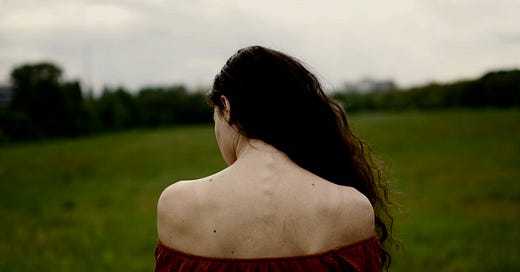In my last essay, I Always Wanted to be like Hannah Arendt, I tied in reflections about this current wartime to a conversation I had back in 2022 on my podcast, Along The Seam, with Ukrainian actress Alina Zievakova (episode #10). As I was returning to that episode and looking through the transcript, it made me want to share more of it here. Maybe you’ve listened to the episode already, but perhaps it’s been a while, or like me, you take in information differently when reading than listening. So as a new practice, when it feels relevant and right, I’m going to share the transcripts from my podcast episodes here on Substack along with additional photographs and relevant art. I will edit the conversations for brevity and clarity.
About Alina: Alina is a Ukrainian actress living in Kyiv. When Russia invaded Ukraine in 2022, she began using theater as an act of resistance and as a way to help others process their trauma and wartime experiences. At the time of this interview, she worked with a theater called Pro English Drama School. When the full scale invasion began, the theater served as a shelter. In this conversation, Alina tells us about her life during the war—everything from the first day of the invasion, her choice not to leave, love during wartime and her hopes for the future. She also shares her experience collecting testimony from her fellow Ukrainians and working as a fixer with foreign journalists. We talk about the act of bearing witness to the war while struggling to survive herself, and about how she insists on sharing what she’s seen, even when her own family doesn't believe her.
Alina and I recorded this conversation on July 20, 2022 through Zoom. I was in Maine and she was in Kyiv.
Please note: These transcripts will be for paid subscribers, but the podcast episodes are always free for all. You can listen here or stream the ALONG THE SEAM podcast wherever you get your shows.
Alina: You know, we were joking with my friend the other day that we were sitting drinking coffee just for a couple of hours. And he's like, you see, we're sitting here drinking coffee as if there is no war. And I'm like, ‘how is there no war if It's the only thing we talk about.’ It's literally the only thing on our minds.
Rachael: Tell me about where you grew up. What was your family like? What are some of your memories of childhood?
Alina: I'm from Zaporizhzhia which is a city in the eastern part of Ukraine where lots of fabrics and plants are located. As many cities in the Eastern Part, it's historically been that the Soviet Union organized some of the cities only to produce, and Zaporizhzhia is one of them. And currently the region is occupied by Russian army. And my family stays there still. I felt always very alien there. Therefore, I moved as fast as I could. But there's one place very close to my heart and soul in my city. It's an island—the biggest river island in Europe—it's called Khortytsia. And the legend goes that Ukrainian warriors who were called Cossacks have been building their fortress there, and you know this Cossacks are the symbol of Ukraine as well because they are known to be this brave, strong man fighting on horses. And nowadays it's more of like a historical site. But there is something energy wise in this place that gives you this ancestral feeling that this earth is so soaked with the history and, you know, there is something mystical about it as well. It's my favorite spot in the city for sure. And right now, like one of the biggest pains for me in everything that happens is when missiles hit the island. Nothing major for now. But still, there is some damage they are targeting it so there will be no water connection. And, you see you asked not connected to the war questions but all roads lead to Rome.
Rachael: That’s actually what I was going to comment on. I ask you about your childhood memory and immediately we're right inside of war. And one of the questions that I had in my head was going to be, how did World War Two and the First World War play into your childhood, but you took me 300 years back. So this is history that is not just your grandparent’s history, but we're talking like great, great, great, great.
Alina: My ancestral history is very complicated because most of my family is Russian. And if we're talking about World War Two, my grandparents from both sides have witnessed it differently. Like my grandmother from my mother's side has been a child of war. She had been very small and she remembers some of it. But my grandfather from my father's side was already old enough. He was in the army and he was captured three times into concentration camps and he was able to escape three times and actually survived the war and became a headmaster of a school and was very into education and stuff like that. But the Soviet Union and all of that bullshit that has been so ingrained into people's heads has affected my family. And currently everybody in my family pretty much supports Russia.
Rachael: Let's go to the start of the war. What was that day like for you? The first day of the invasion.
Keep reading with a 7-day free trial
Subscribe to Along The Seam to keep reading this post and get 7 days of free access to the full post archives.



